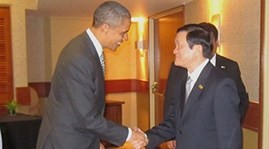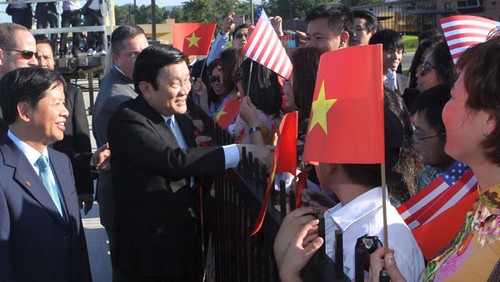(VOVworld) – President Truong Tan Sang’s official visit to the US from July 24th to 26th is an important event marking a new level in the Vietnam-US relationship. This is the second official visit to the US by a Vietnamese head of state in the past 20 years. VOV looks at this forward-reaching relationship.
 |
| The two Presidents met at 2011 APEC Summit |
On July 12, 1995, US President Bill Clinton and Vietnamese Prime Minister Vo Van Kiet agreed to normalize diplomatic ties, a significant milestone in the Vietnam-US relationship. Since then, in a spirit of “setting the past aside, and heading into the future”, the two countries have progressed significantly in bilateral cooperation. Vietnamese Ambassador to the US Nguyen Quoc Cuong told VOV: "In the nearly 2 decades since the normalization of bilateral relations, the two sides have built a firm foundation with stable cooperative mechanisms for bilateral ties. Reciprocal visits and high-level meetings on the sidelines of international conferences have reinforced our relations. The two countries have formed 10 dialogue mechanisms on politics, national security and defense, economics, and development in the Asia-Pacific region."
Besides good political ties and mutual trust, the two countries’ economic and trade cooperation has been flourishing, particularly since the Vietnam-US Bilateral Trade Agreement in 2001. Two-way trade turnover, which was about 400 million USD in 1995, grew 15.6 billion USD in 2009 and nearly 25 billion USD last year.
Cooperation in education, science and technology, research, and response to climate change has seen positive results. The two countries have worked together to address issues remaining from the war and have made significant progress. The two sides have effectively collaborated in regional and international forums, particularly the Asia-Pacific Economic Cooperation (APEC), Asia Regional Forum (ARF), East Asia Summit (EAS), and ASEAN Defense Ministers’ Meeting Plus (ADMM+).
These encouraging achievements are still in an initial stage. As Vietnam strives to become a modern, industrialized country by 2020, the US sees Vietnam as an important partner in the region. President Sang’s US visit aims to identify new cooperation opportunities. High on the agenda will be boosting negotiations of the Vietnam-US bilateral investment agreement and the Trans-Pacific Partnership (TPP) agreement which has the participation of 11 Pacific countries. Ambassador Cuong again: "The two countries are taking an active part in the Trans-Pacific Partnership Agreement negotiations along with 10 other nations and moving towards the signing of the agreement by later this year. The TPP will provide a major new opportunity for cooperation in a vast market of 800 million people which accounts for 40 percent of global trade and GDP."

US Ambassador to Vietnam David Shear, representatives of the US Department of State, Vietnamese Embassy staff and overseas Vietnamese people in the US welcome President Truong Tan Sang at Andrew Airport on July 24.
|
During his visit to the US, President Sang will meet with US President Barack Obama, leaders of Congress, representatives of international organizations, scholars, businesses, and Vietnamese community in the US. Both sides will also seek to forge closer ties in all fields including differences on democracy, human rights, and religion.
Vietnam and the US have gone a long way toward healing the wounds of war and building a resilient and long-term cooperation framework. President Sang’s US visit will uphold Vietnam’s diplomatic policy of multi-lateralization and diversification, independence, self-reliance, and international cooperation. Vietnam treasures its relationship with the US and will further promote a relationship based on the principles of respecting each other’s independence and sovereignty, non-interference in the other’s internal affairs, equality, and mutual benefit.